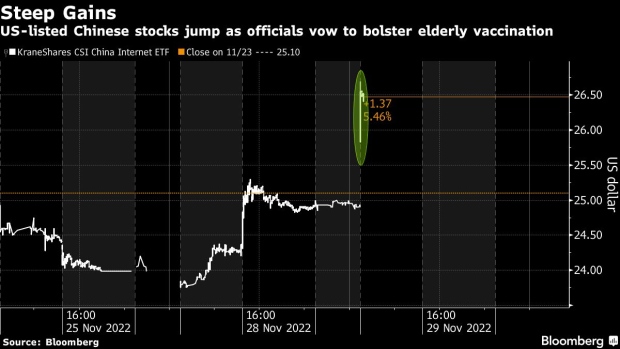Nov 29, 2022
Chinese Stocks Surge in US as Vaccine Drive Fuels Reopening Bets
, Bloomberg News

(Bloomberg) -- US-listed Chinese stocks are on track for the best month ever as investors grow more encouraged about a potential shift away from the strict pandemic policies that have slowed the economy.
The Nasdaq Golden Dragon Index surged 5.1% on Tuesday after Beijing vowed to speed up Covid shots for the elderly, which is seen as a critical step toward allowing the nation to abandon its Covid Zero policy. The gain leaves the benchmark of US-listed Chinese shares up 30% this month, a dramatic turnaround from October’s 25% plunge and the biggest monthly advance since the data begin in 2001.
Chinese stocks in Hong Kong also rose, pushing the Hang Seng China Enterprises Index up over 6% Tuesday and putting it on track for the best month since 2003.
Global investors have become more positive about Chinese equities as Beijing pares back some Covid restrictions and puts forward measures to support the economy and the housing sector. Better-than-expected earnings report from major Internet companies have also helped.
“We think the path towards reopening is set to be bumpy but not derailing,” Morgan Stanley strategist Laura Wang wrote in a note to clients. The direction was established by the Nov. 11 relaxation of Covid guidelines and reinforced by the latest statement detailing the plan for boosting vaccinations among the elderly, according to the note.
On Tuesday, China said it will bolster vaccinations among senior citizens while stopping short of issuing mandates that helped raise inoculation rates in other countries. The country’s top health officials also warned against any excessive control measures during a briefing, while saying China is constantly adjusting its pandemic policies.
READ: China Pushes Elderly Vaccination as Reopening Pressure Grows
The statements came after protesters took to the streets across China over the weekend in a rare act of defiance against the government and its Covid Zero strategy. The demonstrations were muted on Monday after authorities deployed a heavy police presence in major cities and localities pared back some Covid restrictions, soothing concerns that a long-lasting protest may prompt a crackdown.
On Tuesday, the American-listed shares of e-commerce giants Alibaba Group Holding Ltd. and JD.com Inc. rose 5.3% and 6.7%, respectively. Stocks that are set to gain strongly from reopening, such as online travel agency Trip.com Group Ltd. and Yum China Holdings Inc., also climbed.
Meanwhile, the stocks are getting an additional lift from earnings optimism. Bilibili Inc. was the latest to announce better-than-expecting results, pushing its shares up as much as 25% in the US. Pinduoduo Inc. topped analysts estimates on Monday.
To be sure, this group has endured intense price swings marked by fears of new Covid infections, with the standard deviation of daily changes over the past year at roughly 4.3%.
The volatility is likely to continue “due to potential binary sentiment swings between overly simplified hope for a rapid opening-up and disappointment from a seemingly slow and zig-zagging move towards a Covid exit,” Morgan Stanley’s Wang said.
A separate quantitative strategy note from Morgan Stanley said that US institutional investors continued to trim positions in Chinese American Depositary Receipts, while Asia-based hedge fund managers were the dominant buyers amid this month’s rally. US-based mutual funds and hedge funds remained to be net sellers of Chinese ADRs in the fourth quarter, with total estimated outflow of $2.9 billion, according to the note.
Read more: Morgan Stanley Sees Tepid US Fund Sentiment on China Stocks
While China is firmly on a reopening path, it will take time and the pandemic will likely keep weighing on economic conditions through the winter, according to TS Lombard.
“The six-12 month macro and market outlook is increasingly positive, however, we wait for stronger signals of health-care improvements before entering reopening trades,” Rory Green, TS Lombard’s head of Asia & China Research, said during a webinar.
(Updates share moves at close, adds details about Morgan Stanley’s quantitative strategy note)
©2022 Bloomberg L.P.





